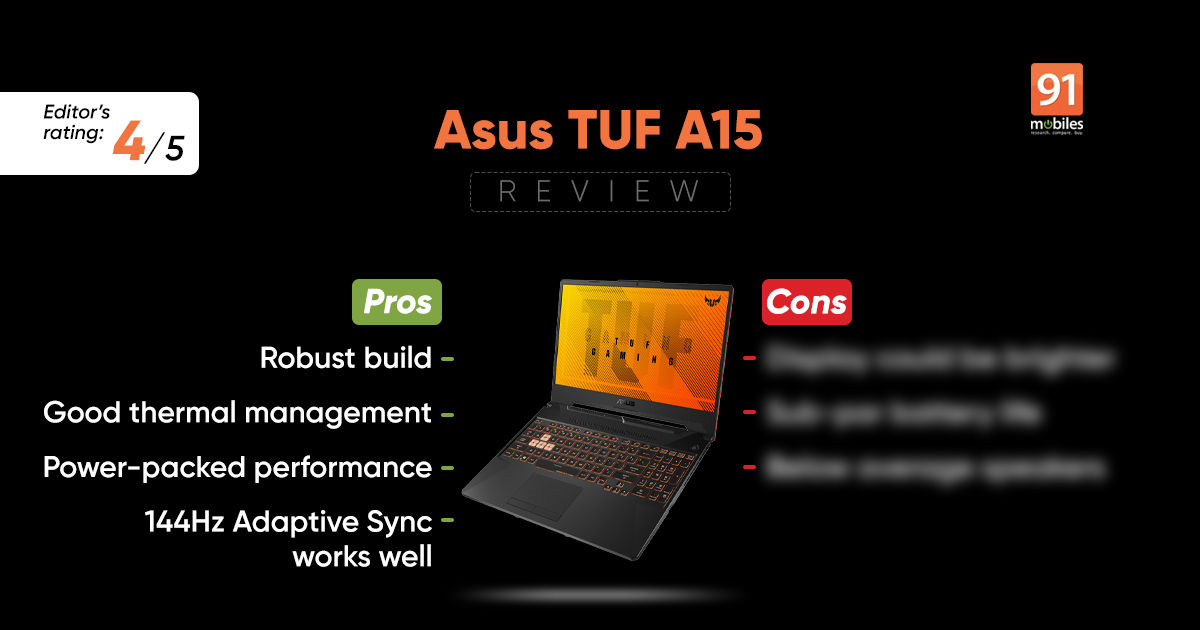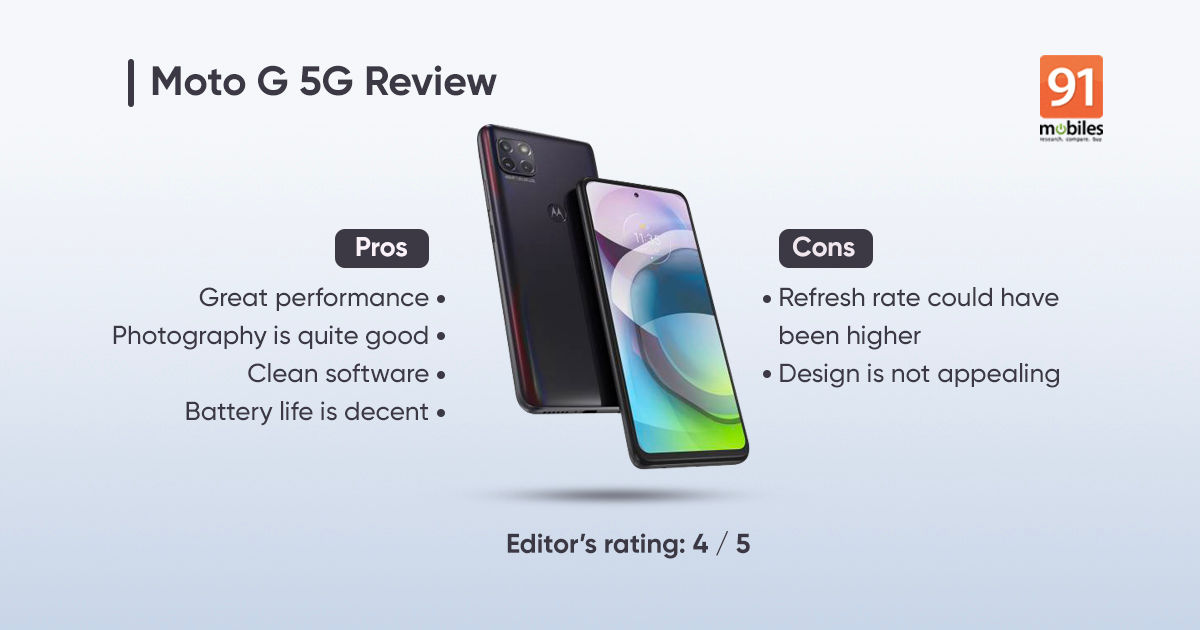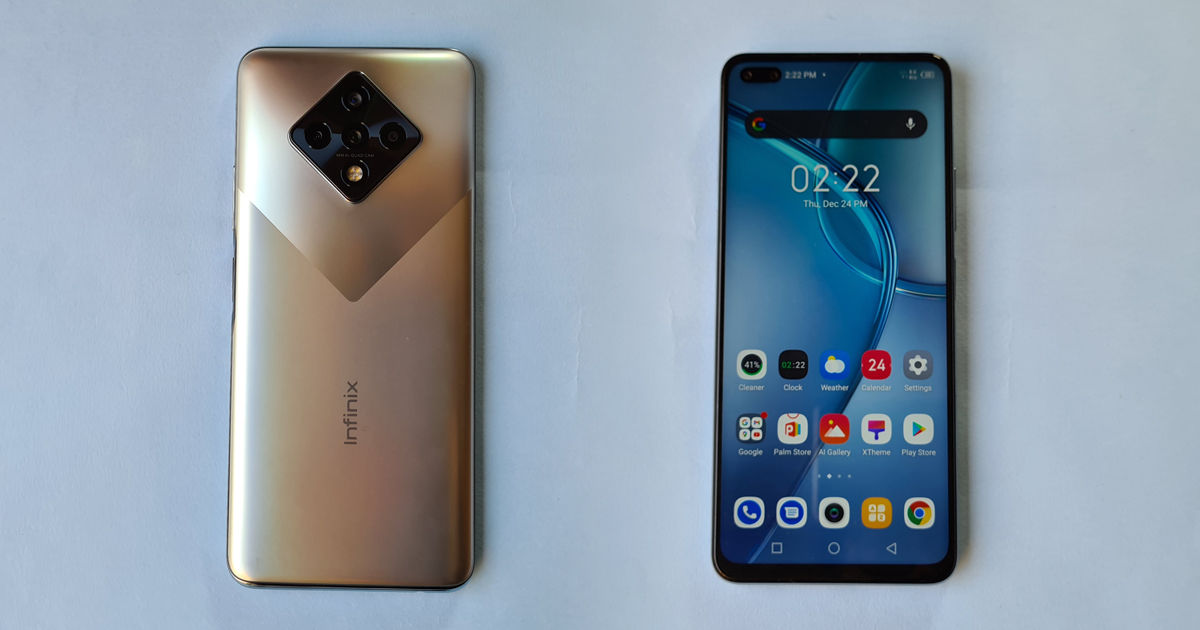ASUS TUF A15 2021 review: a compelling gaming laptop for those on a budget

Taiwanese electronics giant ASUS is one of the most prominent names in the PC world, selling products in a variety of price segments. The company’s TUF laptop lineup has been particularly impressive as of late with provisions for the budget gaming audience as opposed to the more popular ROG series. ASUS announced the TUF A15 recently with the new AMD Ryzen 5000 series upgrade in the Indian market, starting at a very reasonable Rs 65,999. There are a couple of differentiating factors that set the TUF line apart, one of which is the MIL-STD-810H military-grade testing certification. My review unit is a specced-out beast that will set you back Rs 1,03,990, but for the price, you are really getting it all, at least on paper. Let’s find out more about TUF A15 in this full review of the device.
Table of Contents
Build, design and display
The TUF A15 emboldens the ‘TUF’ part of its name with its extremely robust and sturdy design. The TUF A15 has a rather thick body which throws some doubts over its portability, as it weighs nearly 2.5 kgs. However, if you are planning on taking the laptop in extreme weather conditions, the MIL-STD-810H certification has you covered, since it should be able to withstand sub-zero to scorching hot temperatures. Even so, for casual gamers such as myself, the laptop should barely move away from the desk. The chassis is made from plastic and has very little flex in the middle while the hinge has a firm construction that can prop up the lid up to an angle of about 120 degrees. A multitude of cooling vents are placed on the back and the right, while the speakers are present on either side of the laptop. The power button has a unique hexagonal look to it but there is no fingerprint sensor. ASUS has made the new TUF branding, which is much more nuanced and appealing than the predecessor, prominent on the lid’s back and the overall aesthetic feel of the laptop does exude gamer vibes.
Like last time around, almost all ports are present on the laptop’s left side, while a solitary USB 3.2 Gen1 port is on the right. There are two more of those on the left alongside a USB 3.2 Gen2 Type-C with DisplayPort capabilities, an HDMI 2.0 port, an Ethernet port, and a 3.5mm headphone jack. The lack of Thunderbolt 4 is obvious since it is proprietary to Intel CPUs. As for the wireless connectivity, the TUF A15 comes with Wi-Fi 6 (802.11ax) and Bluetooth 5.1.
The variant I’m reviewing comes with a screen boasting 144Hz adaptive refresh rate, along with the standard 1080p resolution and 16:9 aspect ratio. The bezel on the display is quite wide at the bottom, but slim on the other three sides. The hinge placement allows you to view A15’s status LEDs even while the lid is closed. The colours on the display are slightly contrasty and the viewing angles are also not the greatest. In terms of overall brightness, I certainly did not have any trouble with indoor usage but had concerns over legibility under bright sunlight. Adaptive Sync played a vital role in matching the display’s refresh rate with the GPU’s fps output. Gameplay-wise this reduces framerate tears and lag to a large degree. ASUS claims 100 percent sRGB coverage but I still wouldn’t use the TUF A15 for professional visual work like colour grading.
Keyboard and trackpad
ASUS makes use of a traditional chiclet-style keyboard that is quite prominent on its ROG and VivoBook lineup. The buttons are clicky, travel is quite shallow and there is a full-sized dedicated numpad on the side as well. Typing on the keyboard is generally a breeze and the WASD keys’ transparent design is a nice touch for gaming. As for backlighting, you have a very bright RGB light that illuminates all the keys and is adjustable via the Armoury Crate app on the desktop, or by using the arrow keys on the keyboard. Speaking of which, the arrow keys are slightly smaller than the regular keys which could be a cause of concern for gamers. There are three levels of brightness to the backlighting.
The laptop has a trackpad that delivers a low-latency output and is generally very adept at recognising multi-finger gestures… but for the purposes of gaming, you will most likely be investing in a mouse anyway. I do like the inclusion of two separate buttons for facilitating right and left clicks instead of giving the trackpad a giant button underneath.
Performance and battery
Here is one department where the TUF A15 packs a lot. The model I’m reviewing comes with AMD’s 5000 series Ryzen 7 5800H CPU based on the new Zen 3 architecture. The Ryzen 7 is an octa-core processing unit with 16 threads and a base clock speed of 3.2GHz. The default TDP is 45W and since it’s made using a 7nm FinFET process, you can certainly expect the laptop to be power-efficient. It’s a gaming machine and that means it can handle normal day-to-day tasks with ease. The TUF A15 showed no sign of lag even while I ran 50 Chrome tabs along with Shadow of the Tomb Raider on the highest graphics settings. Performance mode is on by default and I conducted all my tests tied to it. As far as benchmarks go, Cinebench’s R23 single-core and multi-core scores of 1,423 and 11,162 are testaments enough to the A15’s CPU capabilities. Geekbench 5 also echoed the same feeling with scores of 1,400 and 7,188. Day-to-day work case scenarios are simulated in PCMark 10’s benchmark which shows a healthy overall score of 6,591. In terms of memory, the laptop packs in 16GB of DDR4 RAM along with 512GB of NVMe SSD and 1TB HDD. I also ran CrystalDiskMark’s Sequential Read/Write tests and obtained speeds of 3,592MB/s and 2,941MB/s, which are quite impressive.
Moving on, the graphical capabilities of the device is handled by the NVIDIA RTX 3060 although the base version of the laptop uses the GTX 1650. Even so, providing an RTX 3000 series GPU at this price is rather impressive. As mentioned above, Adaptive Sync works exceedingly well in providing a lag-free experience on the 144Hz display. The Shadow of the Tomb Raider benchmark outputted 91fps at the highest settings and 86fps at high settings. 3DMark’s Time Spy returned a score of 7,538 which is consistent with other 3060-powered laptops. I did play Valorant and Call of Duty Warzone at Extreme and Highest settings respectively for 100-110 fps counts without sweat. The fans revved up pretty loudly after about an hour of gaming and the base also got pretty warm to the touch. Even so, the thermal management of the device is handled well by the four heat pipes and three heatsinks to deliver sustained performance for a very long time. Worth mentioning that the speakers on the A15 are nothing special, with a flat sound that can be masked quite easily by the noise of a nearby ceiling fan.
The battery life on the device isn’t great, with the laptop turning off in just under 4 hours of normal usage involving mostly running Netflix and occasionally checking my mail. That’s par for the course for most gaming laptops though. In any case, the full utility of the machine only becomes evident while it is plugged in, so you won’t have to worry about battery life. However, the laptop is not suitable to be taken on trips if power sockets are expected to be scarce.
Final verdict
The ASUS TUF A15 is a genuinely great performer and has a price tag that has been set keeping affordability in mind. A similarly-specced ROG Strix G15 is being sold for about Rs 20,000 higher. Yes, the TUF A15 is slightly bulky and not very portable, but it serves the function it has been made, which is effortless lag-free casual gaming. It has the gamer vibe and plenty of features such as Adaptive Sync to bring out the best as far as graphical tasks are considered. The display could have been brighter, the speakers louder and battery life a lot better, but the average gamer looking for an entry into this segment will likely be unperturbed by these niggles. I can safely say that the ASUS TUF A15 is one of the best options for entry-level gaming in the market.
Editor’s rating: 4 / 5
Pros:
-
Robust build
-
Good thermal management
-
Power-packed performance
-
144Hz Adaptive Sync works well
Cons:
-
Display could be brighter
-
Sub-par battery life
-
Below average speakers







